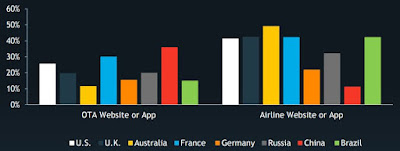The world wide web has opened the kimono as Online Travel Agencies (OTAs) like Expedia and Orbitz have grown in popularity and allowed travelers to search the full inventory across providers by publishing GDS content online. On top of the OTAs, Metasearch sites like Kayak and TripAdvisor arrived to make sense of the overwhelming volume of content increasingly available, steadily shifting search volume from the OTAs.
 |
| Source: Phocuswright Research. |
As OTAs and Metasearch sites continue to proliferate, the problem is only exacerbated by the influx of travel-related apps. With all the options to learn about travel, we find ourselves back in the original conundrum of too much information and no idea where to start. Enter: Google.
Industry studies have found that, regardless of where a traveler begins their trip search, a majority of bookings are ultimately made directly with the travel provider. This is especially so for airlines.
 |
| Source: Phocuswright Research. |
As an example, I tried a recent Google search for "flights to Boston" and was met with an entire first page completely devoid of any links to actual airlines:
I found similar result crowding from OTAs and Metasearch sites with comparable queries for hotels (e.g. "hotels in Miami"), with the notable exception of Marriott* showing up repeatedly in both paid and search results. Car rental queries (e.g. "car rental Philadelphia") repeated the same findings to a slightly lesser degree.
There is clearly an opportunity for travel providers to better both their natural PageRank and their paid advertising. In an industry of eroding customer loyalty, travel providers are well served to focus on obtaining their customers early rather than relying on queries fed through OTAs and Metasearch sites.
* It's worth noting that a response to my last post about social media in the hotel industry called out Marriott as another fantastic example of social marketing for their recent partnership with GoPro to record and share experiences at Marriott properties across the Caribbean and Latin America.

No comments:
Post a Comment